Thank You Steve
Many of the posts over the past day since Steve Jobs announced his resignation from the position of CEO at Apple have been about what he meant to the computer industry and Silicon Valley, the way he innovated music and communications and his general contributions to the world. This post is about what Steve Jobs has meant to me.
Coming to UT as a Ph.D. student in 1999, straight from Compaq Computer and having worked at NCR Corporation (at the time a maker of PC clones), I was fully indoctrinated in the PC world. I’d pretty much never even touched a Mac. My first experience was in the computer lab, when I was trying to get out my 3 1/2 inch disk from the Mac that had been available for me to use. I had to ask the kid sitting next to me, who was likely a sophomore, what to do, and I was aghast when he suggested “dragging it to the trash.” So much for being an impressive and all knowing graduate student. In the beginning, I had arguments with friends and colleagues about Apple computers just being too expensive and not worth the extra money. I saw them as an unnecessary luxury.
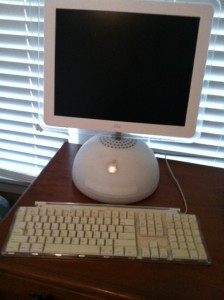 But over the course of the year or so that I began using Macs on a regular basis in my teaching, something changed. The Compaq PC I had at home became the object of my own personal ridicule and disdain. I just didn’t feel the same working in Windows as I did on the Macs at school. When it came time to replace my PC, I was pretty much on board with Apple and there was no going back. I remember watching Steve do the introduction of the round-based iMac on TV. The way the computer raised up slowly to reveal the swiveling, thin, flat screen integrated with the unit. I don’t think I’ll ever forget that moment. I had to have that computer. I used it for six years of solid computing – Web design, photo and graphic manipulation, video editing. It was still going strong on the day I replaced it with a 24″ iMac, and it is still proudly sitting here on the desk next to me, ready for me to fire up any time I need to check for an old file. I use a MacBook Pro that belongs to my department, and the lab I teach in now at Texas State was replenished with beautiful 27″ iMacs last year.
But over the course of the year or so that I began using Macs on a regular basis in my teaching, something changed. The Compaq PC I had at home became the object of my own personal ridicule and disdain. I just didn’t feel the same working in Windows as I did on the Macs at school. When it came time to replace my PC, I was pretty much on board with Apple and there was no going back. I remember watching Steve do the introduction of the round-based iMac on TV. The way the computer raised up slowly to reveal the swiveling, thin, flat screen integrated with the unit. I don’t think I’ll ever forget that moment. I had to have that computer. I used it for six years of solid computing – Web design, photo and graphic manipulation, video editing. It was still going strong on the day I replaced it with a 24″ iMac, and it is still proudly sitting here on the desk next to me, ready for me to fire up any time I need to check for an old file. I use a MacBook Pro that belongs to my department, and the lab I teach in now at Texas State was replenished with beautiful 27″ iMacs last year.
In that time, we have been introduced to iPods, iPhones and iPads. I own them all. I feel a bond with each product, and I love the way they integrate with my life. I also love talking to students about Apple, their philosophy, their contribution, their leader. I often have students who don’t feel the same way I do now about Apple, who are dyed-in-the-wool PC fans, and I can relate, because I was one of them. I have tried over the years to explain in a fair manner, just what the appeal is. But it’s not that easy. It’s difficult to articulate all the things that make Apple special. It’s in the details. And it’s how it makes you feel when you use one.
When I was a graduate student teaching at UT, I taught a semester in a lab that had both Macs and PCs. The students usually selected the computer based on their own cultural alignments with the platforms. One day, one of the normal PC people arrived late to find all the PCs had been taken. He was a little stunned when I told him to just sit at the Mac and he’d be fine. A few days later, I noticed him arriving early, but selecting one of the Macs instead. By the end of the semester, he asked, “So, how much do one of these Macs cost?”
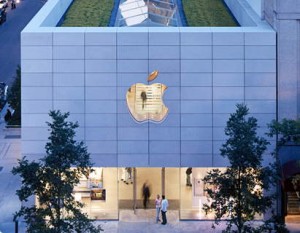 That student, like many others, was converted just by using one, and that’s the brilliance of Steve Jobs and Apple with their retail stores. Conventional wisdom was that the retail effort would fail. But Apple knew that if they got the products in people’s hands, allowed them to use them at will and have their questions answered, they could convert people. And boy was that successful. They put the same detail into creating a retail experience as they did in developing products. I remember one day I was in Chicago, walking down Michigan Ave. It was a blustery winter day, as it often is in Chicago, and I was trying to decide how much further I could walk before I would freeze. I remember looking up and seeing the Apple logo. I walked into the store and it was like entering the pearly gates. It was welcoming and spacious and most importantly, warm. The predominant color of white gave the appearance that I was floating on a fluffy cloud. I was able to freely use the computers, browse, check email, and no one bothered me. No one tried to sell me anything. People smiled and were friendly. That was the first time I entered an Apple store, but I can recall that feeling of contentment like it was yesterday. I knew something different was afoot there. Just about any major city I visit, one of my top attractions is a visit to the Apple store. I stood in line for eight hours at the Austin store at the Domain when I bought my first iPhone (3G) and also stood in line (only 45 minutes this time) at the popup store during SXSW this year to get my iPad2.
That student, like many others, was converted just by using one, and that’s the brilliance of Steve Jobs and Apple with their retail stores. Conventional wisdom was that the retail effort would fail. But Apple knew that if they got the products in people’s hands, allowed them to use them at will and have their questions answered, they could convert people. And boy was that successful. They put the same detail into creating a retail experience as they did in developing products. I remember one day I was in Chicago, walking down Michigan Ave. It was a blustery winter day, as it often is in Chicago, and I was trying to decide how much further I could walk before I would freeze. I remember looking up and seeing the Apple logo. I walked into the store and it was like entering the pearly gates. It was welcoming and spacious and most importantly, warm. The predominant color of white gave the appearance that I was floating on a fluffy cloud. I was able to freely use the computers, browse, check email, and no one bothered me. No one tried to sell me anything. People smiled and were friendly. That was the first time I entered an Apple store, but I can recall that feeling of contentment like it was yesterday. I knew something different was afoot there. Just about any major city I visit, one of my top attractions is a visit to the Apple store. I stood in line for eight hours at the Austin store at the Domain when I bought my first iPhone (3G) and also stood in line (only 45 minutes this time) at the popup store during SXSW this year to get my iPad2.
A few years ago, in a graduate class, we were discussing the Apple/PC dichotomy and I asked the class if they “loved” their computer. The people who owned Macs enthusiastically raised hands without missing a beat. But the PC users all were sitting around a bit befuddled. One of the students said “Well, I like my PC and it does everything I need it to do.” And, I shot back, “I didn’t ask if you liked your computer, I asked if you LOVED it.” He was confused. A year later, and after regular use of the Macs in our lab and hearing me talk about my own love of Apple products, the same student wrote this blog post, detailing his own journey over to Apple. He understood that the brand is everything and there has to be something behind it, even if you can’t completely articulate exactly what that is. 😉
I always ask students if they are a Mac or PC on the first day of class. It gives us a good platform to talk about the philosophical differences between them, Apple’s closed nature of developing for their hardware only, versus Windows which runs on a variety of manufacturers’ products. Same with Android – we discuss the philosophical and practical differences in the two. Just yesterday, I had students beaming with wide smiles as they talked about the Apple products in their lives. One student introduced the topic by saying that she was about to celebrate her one-year anniversary with her MacBook on Sept. 2. People have relationships with these products. And, I truly believe that the reason why people feel so strongly about the products is in the way the products make them feel about themselves.
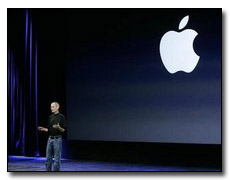 And while Apple is a big company, it’s Steve Jobs that set that tone for the entire organization, and more so, several industries. I have watched just about every black turtleneck keynote since 2001, followed the live blogs intently for those that were not broadcast. I marvel at the way Jobs is able to captivate, calmly, yet with enthusiasm. I lived for the “one more thing” moment. I have read many articles, watched just about every video on his life that is available. I am inspired by his ability to “think differently.” I am stunned by his intuition, his ability to drive innovations in the direction of where we will be, not where we are, and to make products that people will want, not what they tell you they want. I was in awe reading this article in Wired in 2008 by Apple expert Leander Kahney “How Apple Got Everything Right By Doing Everything Wrong.” The article ends with this quote by author Geoffrey Moore. “Everything that’s happening is playing to his values. He’s at the absolute epicenter of the digitization of life. He’s totally in the zone.” What an enviable position in which to be. I want to be in that zone.
And while Apple is a big company, it’s Steve Jobs that set that tone for the entire organization, and more so, several industries. I have watched just about every black turtleneck keynote since 2001, followed the live blogs intently for those that were not broadcast. I marvel at the way Jobs is able to captivate, calmly, yet with enthusiasm. I lived for the “one more thing” moment. I have read many articles, watched just about every video on his life that is available. I am inspired by his ability to “think differently.” I am stunned by his intuition, his ability to drive innovations in the direction of where we will be, not where we are, and to make products that people will want, not what they tell you they want. I was in awe reading this article in Wired in 2008 by Apple expert Leander Kahney “How Apple Got Everything Right By Doing Everything Wrong.” The article ends with this quote by author Geoffrey Moore. “Everything that’s happening is playing to his values. He’s at the absolute epicenter of the digitization of life. He’s totally in the zone.” What an enviable position in which to be. I want to be in that zone.
But the thing that most inspires me about Steve is his commitment to doing great things through loving what you do. I am someone who knows the power of that statement, who knows the dramatic and profound difference it can make in one’s life to simply find a career that you love. Steve let me know that it was more than OK to have sought that out. It was required. He said, in that great Stanford commencement speech in 2005 , “don’t settle,” and I can think of no better advice.
I have never met Steve Jobs, never been in the same room as him, never attended an event where he was speaking, never shared the same air with the man. And while I have met a few people in my life that I would consider magical, I can only imagine what it must be like to be in his presence. I’ve read the articles about how tough he is, about how mean he can be. But most who have experienced this seem to convey that he got the best work out of them through the process. I try to keep that in mind when I am critiquing students, when I am tough on them, because I know that will get the best work out of them and they will be proud (maybe later) of that experience. I know that experience will prepare them for the world much better than those who are coddled or who slide through the system. But I know I’m no Steve Jobs. No matter what I do, I will always fail in that regard, because he’s the one that set the bar for excellence. We can only strive to be more like him.
I, like millions of Apple fans and consumers the world over, was saddened by the finality of his announcement to resign as CEO. On the one hand, it was expected and has been in the works since his indefinite medical leave in January. Yet it was so shocking. The wording and brevity of his resignation letter leave a lot of questions, mostly in regard to his health. We all want to know that Steve Jobs is happy in this world. And regardless of his position, or lack thereof, at Apple, I am content knowing that someone like Steve Jobs exists, so we know what is possible. I am lucky to live in a time that includes him.
Thank you Steve, for all you have meant to me. I wish you joy and the best in health. Stay hungry. Stay foolish.
This post was composed on an iMac. Most photos were taken with an iPhone.
One thought on “Thank You Steve”
Comments are closed.
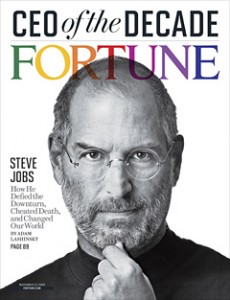

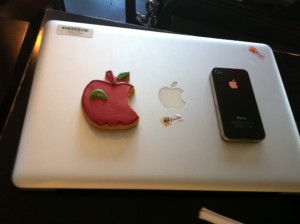
Wow, powerful article, Cindy! And we are recent converts, ourselves.